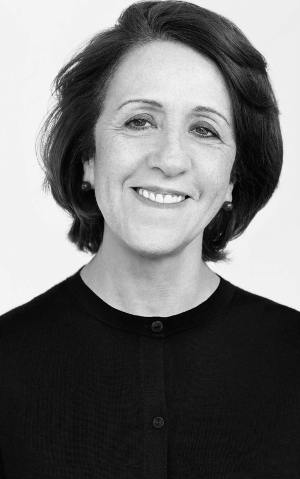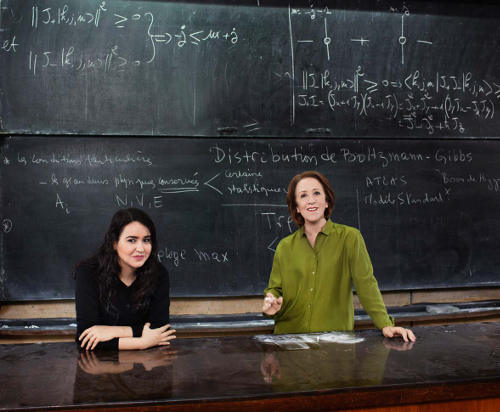The Missing Kingdom: Why Fungi Must Be Central to Conservation Strategy
28 December 2025
Published online 13 December 2016
Award-winning Moroccan nuclear physicist Rajaâ El Moursli talks to Nature Middle East about her pursuit of excellence in her home country and the elusive “God particle” abroad.

El Moursli’s track record speaks for her. In 2015, she won a L'Oréal-UNESCO Award for Women in Science for Africa and Arab states for her key contribution to the detection of the enigmatic Higgs Boson, one of 17 particles predicted by the standard model of particle physics. This discovery was made possible by the Large Hadron Collider at CERN and the ATLAS experiment, which resulted from the collaboration of thousands of scientists from across the world, El Moursli included. The scientist and her team had contributed to the construction, simulation, test and launch of the Electromagnetic Calorimeter, one of ATLAS's sub-particle detectors.
As vice-president of Mohammed V University in Rabat, Morocco and resident member of the Hassan II Academy of Science and Technology, she’s striving to enrich the science culture in the country. She has created the region's first MA in Medical Physics – for which students can apply and study for free. Instead of relocating permanently to the West, where the science infrastructure is stronger, El Moursli accepted a research post in Morocco. She talks to Nature Middle East about some of these choices, and her dreams for science in a region torn apart.
"When I tell my peers about the leap Morocco has made over the last decade in terms of research, I can tell they regret not having come back."
NME: Dr Rajaâ, you made a choice early in your career, to pursue your research in nuclear physics in Morocco instead of France. What inspired this decision, and in retrospect, do you believe it might have stalled your career as a scientist?
RCM: It really wasn't a personal choice to go back to Morocco, I had even been offered a scholarship by the CNRS to continue my studies in France. But after coming back for the summer to prep for my application, my dad would not hear of it and said, “you need to get back here and help your country.” Two years of uncertainty followed, during which I seriously questioned how [well-founded] that choice was. I felt I was moving backwards science-wise. But once I touched base with my peers in France again and initiated some dynamic collaboration with them, things picked up. I was able to get some small grants to do month-long research projects in France from time to time, and even used my own money to conduct experiments. I was bitten by the science bug.
NME: Why did so few Moroccan scientists choose to return home from France. Is the research environment in Morocco any better today?
RCM: Almost all Moroccan researchers in my generation with a post doc or a PhD stayed in France for most of their careers, because it wasn't at all clear at the time what the priority research areas were for Morocco, except in agriculture. In addition, Moroccan universities were keener on hiring professors than researchers, which did not appeal to many who were engaged in thriving research in France. But now when I tell [my peers] about the leap Morocco has made over the last decade in terms of research, I can tell they regret not having come back. The part of the GDP allocated for research, science and development is still small, less than 1%, but major global companies are establishing themselves in Morocco …. They hire local researchers in embedded systems, connected cars and other fields of electronics.… Other dynamic fields of research in the kingdom include agriculture, renewable energy and conventional energy, as well as social sciences.
NME: How did you end up working with CERN?
RCM: In 1996, after months of making a case for a collaboration with CERN in front of university and state committees, Morocco officially became the first African country to enter the CERN. So many people tried to talk us out of it, claiming this utopia would never materialize, but it did. In CERN, a team of nuclear physicists and I built parts of a sub reactor for ATLAS, which was as tall as a five-storey building. ATLAS is a massive detector composed of sublayers of detectors, each in charge of detecting specific particles, and each lab or country is responsible for a sub detector's simulation, construction and data analysis. Our team of scientists from Rabat, Casablanca, Oujda and Stockholm was in charge of building an electromagnetic calorimeter to detect all gamma and electrons.

RCM: The prizes I have received made it possible for me to take an appointment with the minister (of research) and sit with him whenever the need arises. Mohammed V University is in Rabat, and this proved strategic because of its proximity to the minister's office that taps into the large pool of academics and experts located next door whenever a science-related question arises. One of the bigger problems we face, in terms of advancing research, is related to law. But we’re making changes. Last January, a joint decision was signed between our Ministry and the Ministry of Finances which allows the university to receive private money for research projects and manage it without close scrutiny from external bodies. Another thing we are working on is changing students' expectations. They can no longer expect to be hired by the state after they graduate from university. There is no way the state can absorb such a large number. So we established an entrepreneurship centre, an innovation hub and we make sure to promote this creative way of thinking [into graduates].
NME: Your current brainchild is the region’s first master’s degree in medical physics in Morocco. What can you tell us about it?
RCM: The idea came during a conversation I had in 2005 with the Minister of Health and a radiotherapy professor. A new center of radiotherapy was about to open in Agadir, but the minister could not find a candidate trained to use the machine at the centre. None of the young Moroccans studying this field in France had any intention of coming back to Morocco, so training had to be made available locally. In 2009, after many meetings, my free-of-charge MA in Medical Physics was created. I had to find experts and academics willing to teach for free, and even brought some ATLAS colleagues to demonstrate how the accelerator functions, since one of its most common uses is medical. This MA coincided with Princess Lalla Salma's initiative to fight cancer (which killed her mother) by developing centres of radiotherapy, nuclear medicine and radiology all over Morocco. Without this MA, which has trained more than 50 students so far, we would never have been able to find the expertise to run those centres.
NME: There aren’t many established Moroccan women researchers, compared to the number of females who study science. What intervention could be put into place to secure their career paths?
RCM: Moroccan girls make up 40% of engineering schools students, a figure higher than Europe, and are [some of] the best students. Yet, they don't fill high ranking posts and are not very visible in research. Most of them abruptly end their scientific endeavors when they get married. To make sure science loses less talent to marriage, institutions should give out prizes or fellowship to successful female scientists that would give them the authority to keep working. Even if a husband is hesitant, seeing that is wife is recognized and professionally valued would make him proud and more accepting of her choices. Let me tell you what happened to me on my wedding day: my father turned down my dowry, looked at my husband straight in the eye and said, “I don't have cows to sell. I have a daughter who is educated, and I demand that you let her do what she desires professionally.” And my husband has always respected this wish.
doi:10.1038/nmiddleeast.2016.217
Stay connected: